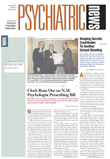The National Institute of Mental Health is funding the largest long-term study ever undertaken of bipolar disorder.
Both researchers and clinicians want to know which treatments are most effective for patients in the depressed and manic phases of bipolar disorder and to identify relapse-prevention strategies. They are also trying to answer the question of which psychosocial treatments improve patients’ quality of life, treatment adherence, and work and social functioning while being cost-effective, according to principal investigator Gary Sachs, M.D., who directs the Harvard Bipolar Research Program at Massachusetts General Hospital.
That hospital along with the University of Pittsburgh School of Medicine is a coordinating center for the federal project.
Sachs told Psychiatric News that the Systematic Treatment Enhancement Program for Bipolar Disorder (STEP-BD) has enrolled 700 patients and that a total of 5,000 will be enrolled at 20 university sites participating throughout the U.S.
Patients who take part in the study will be evaluated, treated, and monitored for five years, according to Sachs, who is an assistant professor of psychiatry at Harvard Medical School.
Among the treatments to be studied are mood stabilizers, antidepressants, atypical antipsychotics, and monoamine oxidase inhibitors. Psychosocial interventions that will also be assessed include cognitive-behavioral therapy, family therapy, and interpersonal therapy.
Sachs says there are several unique aspects to this study. “Patients remain on medication, considered the standard of care, the entire time rather being randomized to placebo. They can leave the study at any time and choose whether to participate in the randomized phase of the study,” said Sachs.
Another unique aspect, he noted, is that patients can enroll in the study at any phase of their illness and will not be excluded if they have a comorbid psychiatric or physical illness, he added.
Because researchers want a study sample that represents all people with the disorder, they are recruiting sufficient numbers of women and ethnic minorities.
“The problem with some clinical efficacy studies on bipolar disorder is that they cannot be applied to the general population. They use an ideal sample that doesn’t represent all patients who seek care,” said Sachs.
About 75 to 100 psychiatrists will be treating the patients in the study after the psychiatrists are trained to use expert peer-reviewed treatment guidelines on bipolar disorder. “They will be instructed to choose among the first-line recommendations,” Sachs explained.
He and his colleagues are also conducting three smaller, NIMH-funded studies concurrent with STEP-BD in an effort to understand how medications to treat bipolar disorder affect women’s reproductive health. The study subjects will already be enrolled in the STEP-BD.
The goal of the first study is to determine whether mood stabilizers such as lithium increase the risk of polycystic ovarian syndrome, said Sachs. That treatable disease is characterized by a lack of ovulation, elevated levels of male hormones, and enlarged ovaries with multiple cysts, according to the STEP-BD Web site.
The second study on women with bipolar disorder will examine whether omega-3 fatty acids can prevent recurrences of bipolar disorder in pregnant women, which some studies suggest. This is important because women who want to become or are pregnant often stop taking their medications due to the risk of birth defects linked to the drugs, according to Sachs. However, the recurrence of mania or depression may be a greater threat to the mother and developing fetus than many of the potential side effects.
The third women’s study will measure the level of lithium in the brain through imaging techniques to determine whether it correlates with depressed bipolar patients’ responses to the drug. Researchers will also assess whether certain levels of lithium in the brain protect women from episodes of mania or rapid cycling.
Women make up two-thirds of the rapid-cycling subtype of bipolar disorder, which accounts for roughly 15 percent of all people with the disease, according to the Web site.
About 525 women will be enrolled in the first study, 36 women in the second study, and 40 women in the third study.
Detailed information on the STEP-BD including a list of the treatment centers and how patients can enroll is available at www.stepbd.org/public/faq.html.
A description of the three women’s studies is available at www.stepbd.org/research/womenhealth.html. ▪
